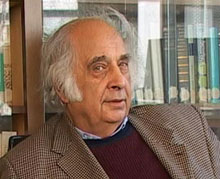Al borde de una bifurcación en mi investigación y gracias al intercambio académico con el más cercano de mis colaboradores, ja, ja, ja es decir, el Soc. Christian Calderón estoy buscando darle a mi trabajo académico una dimensión más cualitativa.
Para ello, he estado leyendo algunos documentos y he encontrado algunas vertientes que me parecen además de interesantes, apasionantes. Me refiero al sentido que tiene una representación según Sigmund Freud y el de una representación social para Serge Moscovici.
Aun estoy en “proceso de adquisición de ese nuevo conocimiento” por lo que disculpen, los expertos, ya que el contenido de estas líneas puede ser incorrecto, claro que si me pongo muy filosófica, son verdaderas porque en este momento para mí son verdaderas.
Me parece que es primordial que intentemos comprender e indagar nuestra “psique”, en profundizar sobre nuestro inconsciente, según Freud en él estan todos los secretos de nuestra personalidad. Analizándolo, podemos llegar a detectar nuestros miedos, angustias y deseos y sin duda vivir con “salud mental”. Leyendo me he interesado en saber lo que es una pulsión, un acto fallido, un complejo de Edipo, pero paciencia, ya habrá tiempo para descubrirlo y en su momento compartirlo.
Ahora me detengo aquí, antes de publicar ideas que no son claras, sin embargo ahora me parece primordial entender lo que es “le ça”, “le moi” et “le surmoi”, en español, es “el ego”, “superego” y “el id”. ¿A qué se refiere? ¿Cómo diferenciarlos? ¿Cuál es su relación con el consciente y el inconsciente?
Espero saberlo y descubrirlo pronto, hoy solo quiero compartir algunas definiciones para la reflexión, no pienso ir esta vez a la Wikipedia (eso se los dejo a ustedes) y disculpen los hispanoparlantes, que habrá también definiciones en español si puedo obtenerlas de una buena fuente.
Ça: Une des trois instantes (avec le moi et le surmoi) distinguées par Freud dans sa deuxième théorie de l’appareil psychique. Le ça constitue le pole pulsionnel de la personnalité. Ses contenus sont inconscients, pour un part héréditaires et innés, pour l’autre refoulés et acquis.
Moi : Instance que Freud, dans sa deuxième théorie de l’appareil psychique, différencie du ça et du surmoi. Freud décrit le moi comme « le serviteur de trois maîtres », le ça, le surmoi et la réalité dont il doit concilier les exigences contradictoires.
Surmoi : Un des instances psychiques décrite par Freud dans sa deuxième théorie de l’appareil psychique : son rôle est assimilable à celui d’un juge à l’égard du moi.
Mmmm creo que no quedó claro, ni hablar, próximamente tendré nuevos “conocimientos”.
Continuará… que no he olvidado que el punto original de mi cuestionamiento es saber lo que es una representación y una representación social. Al menos hoy entendí que la “teoría de las representaciones” es una de las grandes líneas de investigación de Freud y que esa teoría es uno de los motores del “psicoanálisis”.
 FREUD
FREUD

